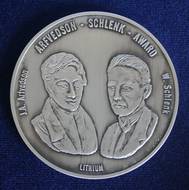


The Arfvedson Schlenk Award is awarded to scientists for outstanding work in the field of lithium chemistry. In 1997 the prize was set up by Chemetall, Frankfurt am Main together with the GDCh. This was followed by sponsor Rockwood Lithium, which became Albemarle Germany GmbH, which now sponsors the award.
The Arfvedson Schlenk Award commemorates two outstanding researchers in the field of lithium chemistry: Johan August Arfvedson (1792 - 1841) discovered lithium in the mineral petalite for the first time in 1817. Lithium attained important scientific and industrial importance. Wilhelm Schlenk (1879 - 1943) worked in the field of free radicals and organometallic compounds and produced the first lithium organyls.



Professor Thomas Fässler is being honored for his groundbreaking research in the field of lithium-rich intermetallic compounds. His work has the potential to advance the development of high-performance lithium batteries. Through systematic optimization, he achieved record values in lithium-ion conductivity and gained valuable insights into the mechanism of lithium-ion conduction. The awardee has set international standards for the development of new, lithium-rich compounds and lithium-ion conductors, and with this award the GDCh recognizes his important role in energy storage and technology.
| 2023 | Thomas Fassler, Technical University of Munich |
| 2021 | Eva Hevia, Bern |
| 2019 | Martin Winter, Munster |
| 2017 | Jan Klett, Mainz |
| 2015 | Clare Grey, Cambridge/UK |
| 2013 | Robert E. Mulvey, Glasgow/UK |
| 2011 | Peter Bruce, St Andrews/UK |
| 2009 | Carsten Strohmann, Dortmund |
| 2007 | Hans J. Reich, Madison/USA |
| 2005 | Dietmar Stalke, Goettingen |
| 2003 | Victor Snieckus, Kingston/Canada |
| 2001 | Gernot Boche, Marburg |
| 1999 | Paul von Ragué Schleyer, Athens/Usa and Erlangen-Nuremberg |
The award is call for proposals in coordination with Albemarle. Three to four members from the GDCh and two Albemarle employees are appointed to the selection committee.
dr Theresa Schmidt, Albemarle (Lead)
Prof. Dr. Viktoria Däschlein-Gessner, Ruhr University Bochum
Prof. Dr. Stefan Kaskel, TU Dresden
Prof. Dr. Florian Kraus, Philipps University of Marburg
Prof. Dr. Eva Hevia, University of Bern
dr Ulrich Wietelmann, Albemarle
This page has been machine translated. If you have any feedback or comments please feel free to contact us. 
last modified: 17.04.2025 10:59 H from Translator